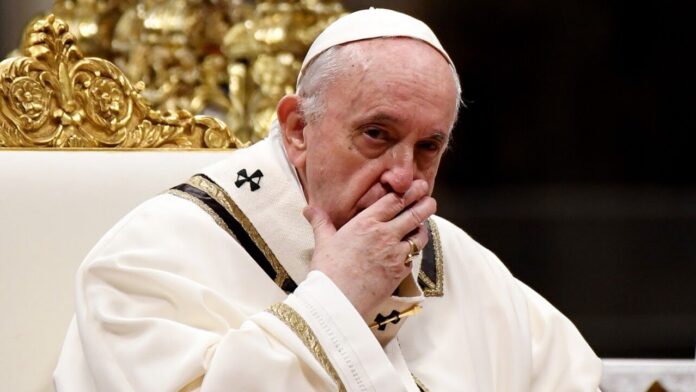Vatican spokesperson emphasizes Pope’s commitment to welcoming church for all
Pope Francis issued a rare public apology after reportedly using a derogatory term to describe the 2SLGBTQ+ community during a private meeting with bishops at the Vatican. The Vatican confirmed on Tuesday that the Pope did not intend to use homophobic language and apologized to anyone offended by his words.
“The Pope never intended to offend or express himself in homophobic terms, and he apologizes to those who felt offended by the use of a term reported by others,” said Vatican spokesperson Matteo Bruni in an emailed statement. This incident, first reported by Italian political gossip website Dagospia, allegedly occurred on May 20 during a closed-door meeting between the Pope and Italian bishops.
Italian media reported that Pope Francis used the Italian term “frociaggine,” which roughly translates to “faggotness” or “faggotry,” in expressing his opposition to admitting gay people into the priesthood. The Vatican’s statement reaffirmed the Pope’s dedication to creating an inclusive church. Bruni emphasized that the Pope remained committed to a church where “nobody is useless, nobody is superfluous, [where] there is room for everyone.”
The Pope’s reported comments have sparked shock and dismay among supporters and critics alike. Vito Mancuso, an Italian theologian and former priest, described the language as “despicable and surprising” given the Pope’s previous messages of inclusivity toward the LGBTQ community. Mancuso’s sentiments echo the broader reaction, highlighting the dissonance between this incident and the Pope’s progressive stance on LGBTQ issues over his 11-year papacy.
Pope Francis has previously garnered praise for his more inclusive approach to the LGBTQ community. In 2013, early in his papacy, he famously remarked, “If a person is gay and seeks God and has goodwill, who am I to judge?” Last year, he took a significant step by allowing priests to bless same-sex couples under certain conditions, despite substantial backlash from conservative factions within the church.
The Pope’s apology marks only the second time he has publicly apologized during his tenure. The first occurred in 2018 when he admitted to making “grave mistakes” in handling a sexual abuse crisis in Chile. He initially dismissed accusations against a bishop suspected of protecting a predator priest as slander. “I apologize to all those I have offended and I hope to be able to do it personally in the coming weeks, in the meetings I will have [with victims],” Francis wrote in a letter to Chilean bishops.
The Pope’s latest apology has led to diverse reactions within the LGBTQ community and beyond. Andrea Rubera, spokesperson for the Italian Christian LGBTQ+ association Paths of Hope, urged continued dialogue despite the incident. “While community members are disappointed over Pope Francis’s use of a homophobic slur, I firmly believe the incident should not drive a wedge between them and the church,” Rubera said.
Despite this setback, many hope the Pope’s apology and commitment to inclusivity will help bridge any gaps created by this incident. The Vatican remains vigilant in promoting an environment of acceptance and understanding.
Analysis
Pope Francis’s apology for using a homophobic slur highlights the complex and often conflicting dynamics within the Catholic Church’s approach to LGBTQ issues. This incident underscores the tension between progressive initiatives and traditional doctrines within the church, reflecting broader societal debates on inclusion and acceptance.
Politically, the Pope’s apology demonstrates the Vatican’s recognition of the importance of maintaining a progressive image in an increasingly inclusive global society. This incident, however, exposes the ongoing struggle within the church to reconcile traditional views with contemporary expectations of equality and respect for all individuals.
Economically, the Pope’s remarks and subsequent apology could impact the church’s relationship with its diverse global following. Financial contributions and support from LGBTQ-friendly congregations and allies might be affected, influencing the church’s funding and community outreach programs. Conversely, conservative factions might view this incident as a reinforcement of traditional values, potentially bolstering their financial support.
Sociologically, the Pope’s language and the subsequent backlash reveal the deep-seated cultural and ideological divides within religious communities. The apology may serve as a catalyst for further dialogue on the inclusion of LGBTQ individuals in religious spaces, promoting a more nuanced understanding of acceptance and diversity within the church.
Gender and representation issues are central to this incident. The use of a homophobic slur by a prominent religious leader underscores the persistent challenges LGBTQ individuals face in gaining full acceptance within religious institutions. The Vatican’s swift response and apology signal an awareness of these issues and a commitment to addressing them, albeit within the constraints of doctrinal teachings.
Locally, the incident has significant implications for the Italian LGBTQ community and the broader European context. It highlights the ongoing struggles for acceptance and equal treatment within conservative societal structures, while also offering an opportunity for increased visibility and advocacy for LGBTQ rights.
In conclusion, Pope Francis’s apology for using a homophobic slur reflects the intricate and often contentious interplay between tradition and progress within the Catholic Church. The incident serves as a reminder of the ongoing efforts needed to promote inclusivity and respect for all individuals, regardless of sexual orientation, within religious institutions and beyond.
